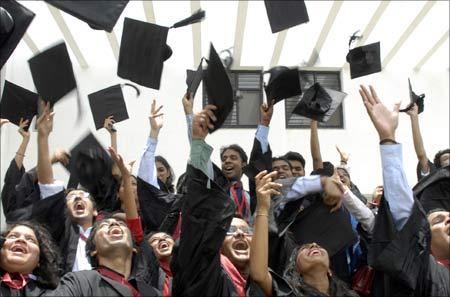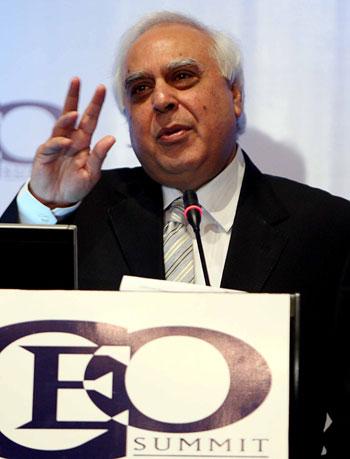Photographs: Reuters
Many Indian graduates today have neither the knowledge nor talent, which the industry needs. Hiring overseas professionals is inevitable, writes Thothathri Raman, chairman, SEAA Trust, New Delhi, the global accreditation advocacy and facilitation organisation.
Forget the brazen claims of the former World Bank team about India's GDP growth rate having stabilised.
Even with the lacklustre economic performance, corporates are already feeling the heat for talent shortage in almost every sphere, making it difficult and expensive to plan ahead.
Expat hiring is no longer fashionable but there is a dire need in healthcare, infrastructure, aviation, telecom, investment and finance and e-commerce which are the growing counters.
Look around and you would find that almost every automobile maker is headed by an expat or NRI Indian, a bulk of the airline industry is manned by expats and the banking system is bristling with global talent -- overseas Indian or expats.
There are predictions that about quarter to half a million NRIs may return to shores to take up plum positions.
Where does that leave the India-born kids with a postgraduate certificate to boot?
Nowhere, as neither are these graduates to be trusted to have the promised knowledge or talent, nor are they in the numbers which the industry desperately needs.
It is hardly believable that the same team in power today, which initiated the economic reforms agenda, has missed the agenda for reforms in education.
Personally, I think the UPA Government has neither the will nor the time to carry out any substantive reforms to clear the mess the Indian higher education is finding itself in to produce the kind of the talent the industry is looking for.
The trouble is everyone knows what ails, but no one wants to do anything about it.
Higher education, unlike any other industry, is completely in shackles with its capacity, pricing, profits, inputs and markets completely controlled and successive regimes have done nothing about this.
Corruption is a major factor in this segment as evidenced by the shameful arrest of the former AICTE chairman on corruption charges.
It is another matter that the political bosses who backed him escaped unscathed.
Owing to severe controls leading to capacity shortages in quality campuses and ambiguity in the way of their working, the higher education institutions are a bed-house of rampant corruption with no let up on capitation fee, especially in medical and management education.
UPA's former HRD Minister Kapil Sibal promised to end all that with his dazzling reforms package for higher education.
Predictably, however, the four Bills which he held forth tantalisingly, had the same hallmark of regimentation, government control, continuing capacity restrictions, restriction on fees and rejection of profit as an incentive for investment in the segment.
Sibal was also impractical.
For instance, the Bill on accreditation promised compulsory accreditation of all the programmes being taught running to tens and thousands of subjects while the world over accreditation is understood as a voluntary peer reviewed quality enhancement process.
The Bill to stop corruption in education promised the kind of obnoxious fines and jail sentences, never heard of in the country in any other industry.
While politicos are to be blamed, much of the blame should rest with the academia and its well known pundits as well who never really bothered to sit together and push hard for reforms in this segment.
'Sibal was impractical'
Image: Kapil SibalPhotographs: Reuters
The trouble is everyone knows what ails, but no one wants to do anything about it.
Higher education, unlike any other industry, is completely in shackles with its capacity, pricing, profits, inputs and markets completely controlled and successive regimes have done nothing about this.
Corruption is a major factor in this segment as evidenced by the shameful arrest of the former AICTE chairman on corruption charges.
It is another matter that the political bosses who backed him escaped unscathed.
Owing to severe controls leading to capacity shortages in quality campuses and ambiguity in the way of their working, the higher education institutions are a bed-house of rampant corruption with no let up on capitation fee, especially in medical and management education.
UPA's former HRD Minister Kapil Sibal promised to end all that with his dazzling reforms package for higher education.
Predictably, however, the four Bills which he held forth tantalisingly, had the same hallmark of regimentation, government control, continuing capacity restrictions, restriction on fees and rejection of profit as an incentive for investment in the segment.
Sibal was also impractical.
For instance, the Bill on accreditation promised compulsory accreditation of all the programmes being taught running to tens and thousands of subjects while the world over accreditation is understood as a voluntary peer reviewed quality enhancement process.
The Bill to stop corruption in education promised the kind of obnoxious fines and jail sentences, never heard of in the country in any other industry.
While politicos are to be blamed, much of the blame should rest with the academia and its well known pundits as well who never really bothered to sit together and push hard for reforms in this segment.



Comment
article